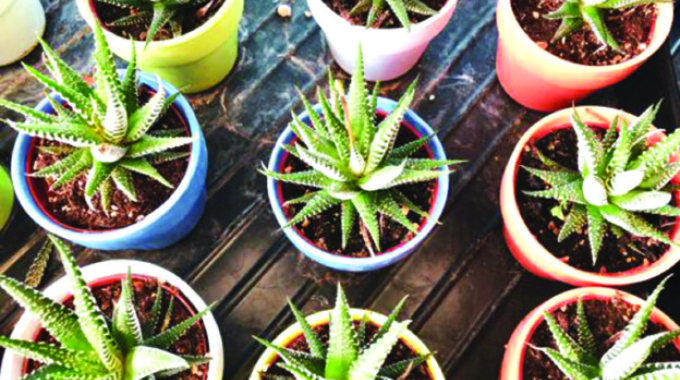
Aloe vera
Aloe plants come in many shapes and sizes, making it easy to purchase something curated to your space. It is a succulent with south-western vibes and a timeless look. Aloe prefers bright indirect light and needs little water. You will want the soil moderately dry between waterings.
You can also harvest the sap for home remedies and skincare, but do not remove more than a third of the plant if you wish to keep it alive.
Cactus
There are many different varieties of cactus and they are all pretty resilient. A cactus prefers warm and sunny spaces but is low-maintenance enough to survive in most places. They need so little water that the easiest way to kill them is by overwatering.
A cactus is a simple way to spice up your space a bit and is the perfect prickly pet.
Cast-iron plant
These plants are as indestructible as their namesake. A cast-iron plant can grow in a wide range of temperatures and prefers lower light. You can even leave it in a dark corner to add a pop of year-round green. The leaves are thick and deep green and the plant is overall lush.
The cast-iron plant grows really slowly, so you should buy it at your desired size. This is typically bigger than your average countertop plant and is best suited for a tropical touch to a living room or bedroom.
Hoya
Hoya plants have a unique bulbousness to their leaves. These succulents are also called wax plants because of their shiny look. They are fast-growing and their leaves will trail or climb up to four-feet long. You can plant them in a hanging basket or train them to grow up a trellis.
Hoya plants will occasionally bloom fragrant flowers in small clusters, especially if you keep them in brighter light. They need little water and you will want to allow the soil to dry between waterings.
Jade
A jade plant can survive weeks to a month without water because it stores the water in the stems and leaves (common for succulents).
The jade plant will basically hibernate if it does not get enough water, and then rehydrate and grow once it is watered again.
It has a thick stem and the oval-shaped leaves grow in a bush-like cluster. They prefer bright sunlight and you should allow the soil to completely dry before watering.
They can live for a really long time and are often passed through generations.
Philodendron heartleaf
As the name suggests, this plant has heart-shaped leaves and long spindly stems.
It is a durable and adaptive plant that can add a romantic touch to your home.
It prefers indirect light, or bright shade, and can grow or trail its vine up to eight feet — perfect for draping over a bookshelf or dresser.
The philodendron heartleaf is also easy to propagate, so you can gift a starter to friends. This plant is super cute, but kind of dangerous, as it is poisonous to pets and humans if consumed.
Rubber plant
The rubber plant, or rubber tree, is a dark green and modern-looking plant. It has a shiny look and can complement more industrial and dark colour schemes. If you do not prune the longer stems, it can grow into an actual tree.
The rubber plant prefers medium to bright light (but not direct sunlight) and limited watering. If the leaves look droopy, it may need more water. If the leaves turn yellow or brown, the plant is being overwatered.
Snake plant
The snake plant succulent has uniquely tall and straight stalks that make for an interesting focal point. They are extremely easy to care for, will certainly survive your two-week vacation and probably prefer you to forget about them.
You also will not have to worry about repotting to accommodate growth and can keep it in lower light. This hardy plant is also known to be an air purifier.
Spider plant
Spider plants are fun, bright and have an eye-catching shape.
The leaves are a bouncy, long and thinly arching.
Once the plant grows pretty big, the ends start sprouting baby spider plants that you can snip off and use to grow a new plant (they resemble tiny spiders, hence the name).
You can plant them in pots or in a hanging basket.
The spider plant prefers indirect sunlight and cooler temperatures. This plants also known for its air-purifying abilities. — activehomeowner
